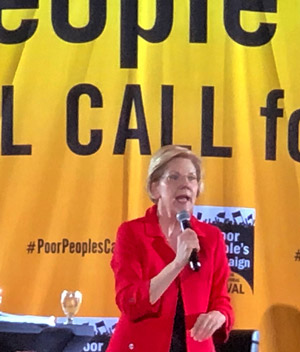Poor People’s Moral Action Congress Launches “Moral Budget”
Published on July, 34 2019
Balcony banners at the Poor People’s Moral Action Congress in Washington, DC, held June 17-19, 2019. Photo: Rowan Fairgrove.
By Rowan Fairgrove
WILPF San Jose
Poverty in the United States is no small issue. 140 million people—more than 43 percent of the population—are poor or low-income, meaning one emergency away from poverty. That figure includes 9 million children, 74 million women, 26 million black people, 38 million Latinx people, 8 million Asian people, 2.14 million Native and Indigenous peoples, and 66 million white people. (See Explaining the 140 Million: Breaking Down the Numbers Behind the Moral Budget).
Building on the work of Rev. Dr. Martin Luther King in the 60s, the Poor People's Campaign (PPC) is stepping up to lift up the poor that our system isn’t serving. The PPC is building a moral fusion movement to bring forward the concerns of those most impacted by systemic racism, poverty, ecological devastation, militarism, and the distorted moral narrative of Christian nationalism. The PPC calls upon our society to see the predicaments of the most vulnerable among us and to halt the destruction of America’s moral vision.
The Poor People’s Moral Action Congress was held at Trinity Washington University in Washington, DC, on June 17-19, 2019. Nearly 1,000 activists – faith leaders, veterans, single parents, homeless advocates, indigenous activists, immigrant rights advocates, and pretty much everyone who cares about the state of the world – came together to question and listen to presidential candidates, attend workshops, and launch a Moral Budget before the Congressional Budget Committee.
On the first day there was a Presidential Candidates Forum, moderated by Joy Reid of MSNBC. PPC founders William Barber and Liz Theoharis questioned each of the candidates with set questions, along with an additional prepared question by a member of the audience. The set questions were about voting rights and what the candidate would do to restore them, whether they would call for a national televised debate on issues of poverty and cuts to military spending. Rev. Barber was also concerned that Democrats organize in the South and not just concede it to the Republicans. He says if you can control the thirteen southern states you can control Congress since they control 26 seats in the Senate, 31 percent of the House, and 170 electoral votes, and represent about one-third of all poor people. We just need to get rid of the “stacking, packing, and bleaching of districts by gerrymandering.”
 Photo: Senator Elizabeth Warren speaks during Presidential Candidates Forum. Photo: Rowan Fairgrove.
Photo: Senator Elizabeth Warren speaks during Presidential Candidates Forum. Photo: Rowan Fairgrove.
All the candidates on both sides were invited, but only nine Democrats came: Former
Vice President Joe Biden, Andrew Yang, Marianne Williamson, Senator Elizabeth Warren, Michael Bennet, Representative Eric Swalwell, Mayor Wayne Messam, Senator Bernie Sanders, and Senator Kamala Harris. It was livestreamed by MSNBC and had many watchers around the world in addition to those of us at the Congress.
Greg Kaufman writing in The Nation summed it up, “As for policy, there was quite a bit that the candidates agreed on: a restoration and expansion of the Voting Rights Act; universal pre-K and affordable childcare; a $15 minimum wage; health care as a right; repealing the Trump tax cut for the wealthy; bringing the troops home from the wars in Afghanistan and Iraq, and reallocating those billions of dollars domestically; making college affordable or free. There was also a shared sense that scarcity of resources is a myth—the United States has plenty of money to do big things. Candidates also seemed to agree broadly that Democrats must respond to the right’s attempts to use race to pit poor people against one another by investing time and energy in building a multiracial coalition.” (Read Kaufman’s full Nation article Finally, Presidential Candidates are Talking About Poverty).
The second day began with a plenary titled “Organizing: Why We Need Moral Fusion Movement in this Moment” and there was a plenary later in the day called “The Attack on Voting Rights, Building Power Among the Poor: Electoral Strategy in Movement Strategy.”
You could choose among five tracks (all-day, in-depth topics) and 12 workshops (morning and afternoon shorter dives). I was fascinated by the all-day option “Theomusicology & Movement Cultural Arts,” but instead I attended two workshops, a morning one on Multi-Faith and Religious Organizing (“Spirit of Struggle: Organizing a Moral Movement”) and an afternoon one on Militarism and the War Economy. I have requested the excellent slides from Brittany from About Face Veterans and hope to be able to share her statistics with WILPF.
Launching a “Moral Budget”
On the third day a group of delegates that included Rev. Barber, Rev. Theoharis, and a variety of people directly affected by current policies were sent off with prayer to testify before the Congressional Budget Committee hearing on Capitol Hill. They presented the PPC Moral Budget document.
The hearing was live-streamed at Trinity Washington University so we all could watch (and cheer or heckle which we wouldn’t have been able to do in the hearing room). The video of the hearing can be viewed here (hearing starts 8:40 minutes in). The Budget document can be found here.
I am so grateful that I was able to attend. Folks came from at least 40 state organizing committees, and everyone I talked to had an amazing story to tell. The level of discourse with any random person I talked with was really high and I learned so much from fellow attendees, as well as from the workshops and plenaries. I absolutely want to go next year to the June 20, 2020 Moral March on Washington.
For more information, contact me at rowanf@gmail.com.



